The Safest Shrimp Safe Leaf Litter for Botanical & Blackwater Aquariums
Freshwater ecosystems are teeming with life! Look in any pond, stream, river, or vernal pool, and you’re sure to discover a variety of fish, plants, and inverts like shrimp and snails. Each plays an important role in the system and works to keep the whole environment in balance. One of the most common questions we get asked at Betta Botanicals is "can I use leaf litter with my shrimp, apple/mystery snails, rabbit snails, ramshorn snails, etc." If fish, inverts, and aquarium botanicals can live in harmony in your local lake, why shouldn’t it be the same in your home aquarium? Let’s explore those questions today and discuss shrimp safe leaf litter!
Shrimp safe leaf litter by Betta Botanicals.
Are Aquarium Botanicals a Good Idea For Shrimp?
You have an established aquarium with fish, driftwood, rocks, and plants. What could you be missing? Well, inverts of course! Freshwater inverts are often called the “clean-up crew” of the aquarium, working hard in the background to keep algae and biofilms off your decorations and glass. There are a variety of options for adding a clean-up crew for your tank, depending on your tank size. The most common choices are shrimp and snails – think neocaridina, ghost shrimp, ramshorns, or mystery snails! Some aquarists don’t like snails (think about the “pest snail” debate), but we believe it’s important to remember that all organisms in an environment help to maintain balance! Inverts usually aren’t difficult to care for either, which makes them great for beginners. However, they do have some environmental considerations to remember. That’s where botanicals come in!
Will Leaf Litter Change the pH of My Aquarium?
Another common question that we get asked is whether botanicals lower the pH of an aquarium. While it’s true that tannins from botanicals can lower the pH in your home aquarium, this isn’t exclusively the case! The pH in your water is dependent on the amount of botanicals you add, the type of botanicals, and the water chemistry itself. Usually general and carbonate hardness (GH & KH) can prevent botanicals from lowering the pH of your water dramatically (if your water has a higher hardness, it will be more resistant to pH changes from botanicals). You can use a home water-testing kit to determine the pH, GH, and KH of your water.
What is the Ideal pH for Shrimp and Snails?
Most freshwater shrimp prefer soft water and a lower pH between 6.8 and 7.0. This makes them an excellent companion for most tropical freshwater fish like bettas! Botanical method aquariums can provide this environment for your inverts. Remember that botanical method aquariums allow us to create whatever water chemistry our inhabitants need, unlike blackwater aquariums, which aim for a specific pH and water chemistry often not suitable for crustaceans.
Betta albimarginata in a blackwater aquarium.
Ideal Aquarium Botanicals for Shrimp & Snails
Are Biofilms Harmful?
Botanicals can provide food for your inverts in different ways. The first way is through the growth of “biofilms”, a collection of microorganisms growing together on a surface. Think of them as the salad dressing on your lettuce. While they can be ugly (they often look stringy and slimy), biofilms are a natural part of aquatic ecosystems! Shrimp and snails love to munch on the biofilms that develop on your driftwood and aquarium botanicals. Shrimp and snails are poopers, too, but that can be a good thing! Processing algae and biofilm from your botanicals into waste unlocks additional nutrients that your plants can feed on. It becomes one healthy, interconnected system.
Will Shrimp Eat the Leaf Litter in my Aquarium?
The second way that botanicals provide food is through “feeder botanicals”. These are leaves that your shrimp and snails will eat as food (not just the biofilms that grow on them). What nutrients they can’t get from biofilms and algae alone can be supplemented with feeder botanicals.
The Best Stinging Nettles for Shrimp
At Betta Botanicals, we love nettles for feeding our aquatic inverts. Stinging nettles are known to provide health benefits for people and inverts alike! Stinging nettles are a superfood for your shrimp, snails, and other aquatic inverts, providing important vitamins and minerals like Vitamin C and Calcium. We are proud to offer high-quality stinging nettles for all of your aquatic needs, you can buy stinging nettles here! Unfortunately they are a seasonal item only available in the spring.

Shrimp eating stinging nettles.
Bamboo Leaves Are Shrimp Safe
Bamboo leaves are another great option for feeder botanicals in your aquarium. A recent study from the USDA found that bamboo leaves and shoots contain high levels of important nutrients and minerals, including iron, calcium, and amino acids. The nutrient content varies depending on how the leaves are harvested, but regardless are shown to have great health benefits for humans and animals alike! You can purchase shrimp safe bamboo leaves here!
Bamboo leaves at Betta Botanicals.
Other Shrimp Safe Botanicals We Love
Every product we sell is 'shrimp safe', but there is limited knowledge on exact nutrient levels of all dried leaves. You can discover all of our shrimp safe botanicals on our website. These include loquat leaves, guava leaves, dregrea pods, banana stems, catappa leaves & indian almond leaves, and recently we have grown to love banana leaves.
Calcium Fortified Food for Shrimp and Snails
Calcium is a critically important nutrient for your aquarium inverts. Shrimp have exoskeletons which rely on calcium to form, and snails use calcium to grow strong, healthy shells. According to Smithsonian Magazine, snails build their shells using “an organ called a mantle to secrete layers of calcium carbonate, which crystallize and harden.” If you don’t provide enough calcium, your snail’s shell will begin to weaken and look like it’s dissolving. No wonder having an abundance of calcium and calcium-rich foods is necessary to keep your clean-up crew happy and healthy! No worries, this can be achieved through monitoring GH and selecting the right foods! At Betta Botanicals, we recommend stinging nettles and calcium-fortified shrimp foods like these from Kats Aquatics!
Shrimp eating calcium + nutrition shrimp food.
Are Botanicals Good for Inverts?
Are tannins and botanicals good for shrimp and snails? Yes! In the wild, shrimp and snails can be found in ponds and river systems filled with botanicals and tannins. Have you ever wondered why you find so many snails around murky, algae-filled ponds? Tannins aren’t every fish keeper’s cup of tea, but at Betta Botanicals, we aim to bring a little slice of nature into your home!
Botanicals are Safe for Aquarium Invertebrates
Freshwater ecosystems are so much more than just fish and plants! The next time you visit your local stream or lake, take a closer look at its inhabitants – we’re sure you’ll see everything from fish to insect larvae to inverts like shrimp and snails. Inverts are a great choice to bring a little more activity to your home aquarium; they are easy to care for and make great clean-up crews! At Betta Botanicals, we are proud to carry everything you need to keep your new additions happy and healthy. Happy fish keeping!
Written by Clare Mangan, @The.Grumpy.Betta, with edits from #TanninBae Himself
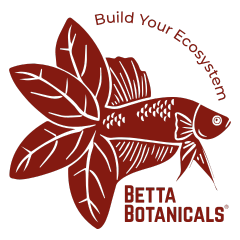
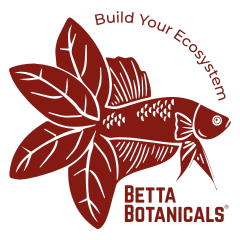
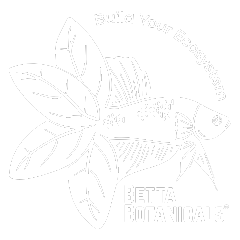
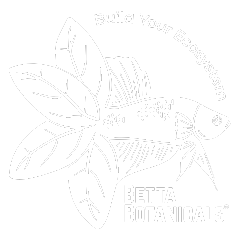
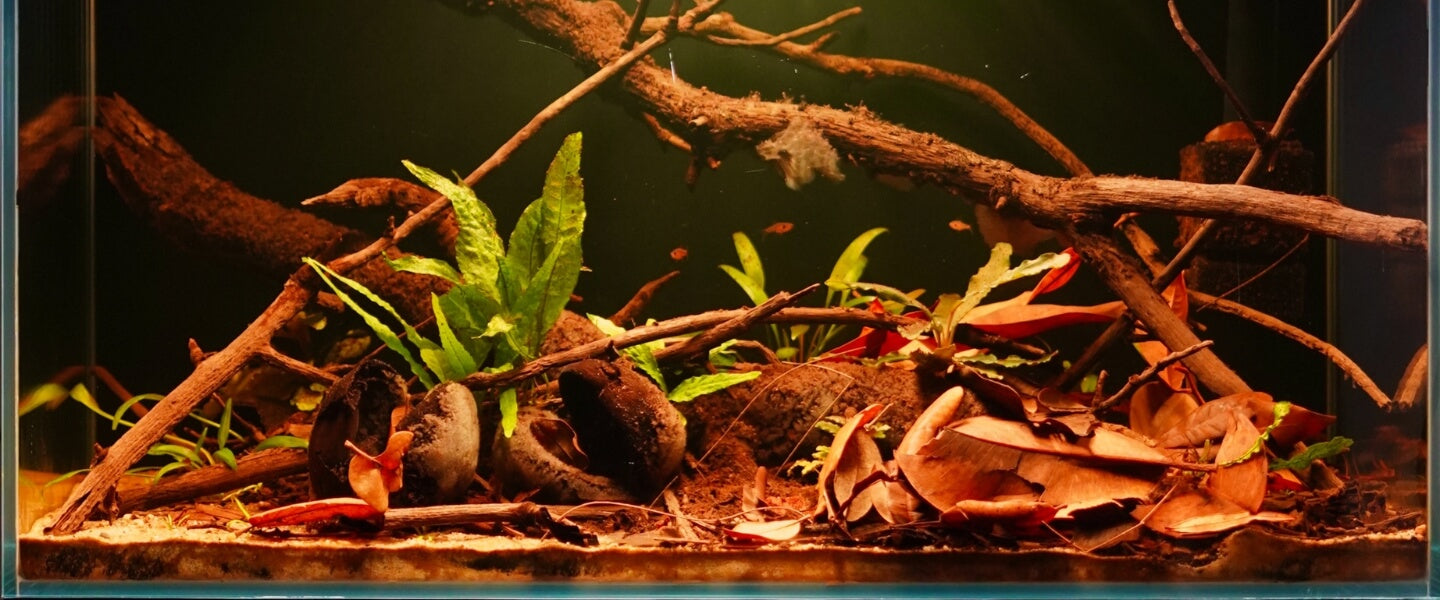





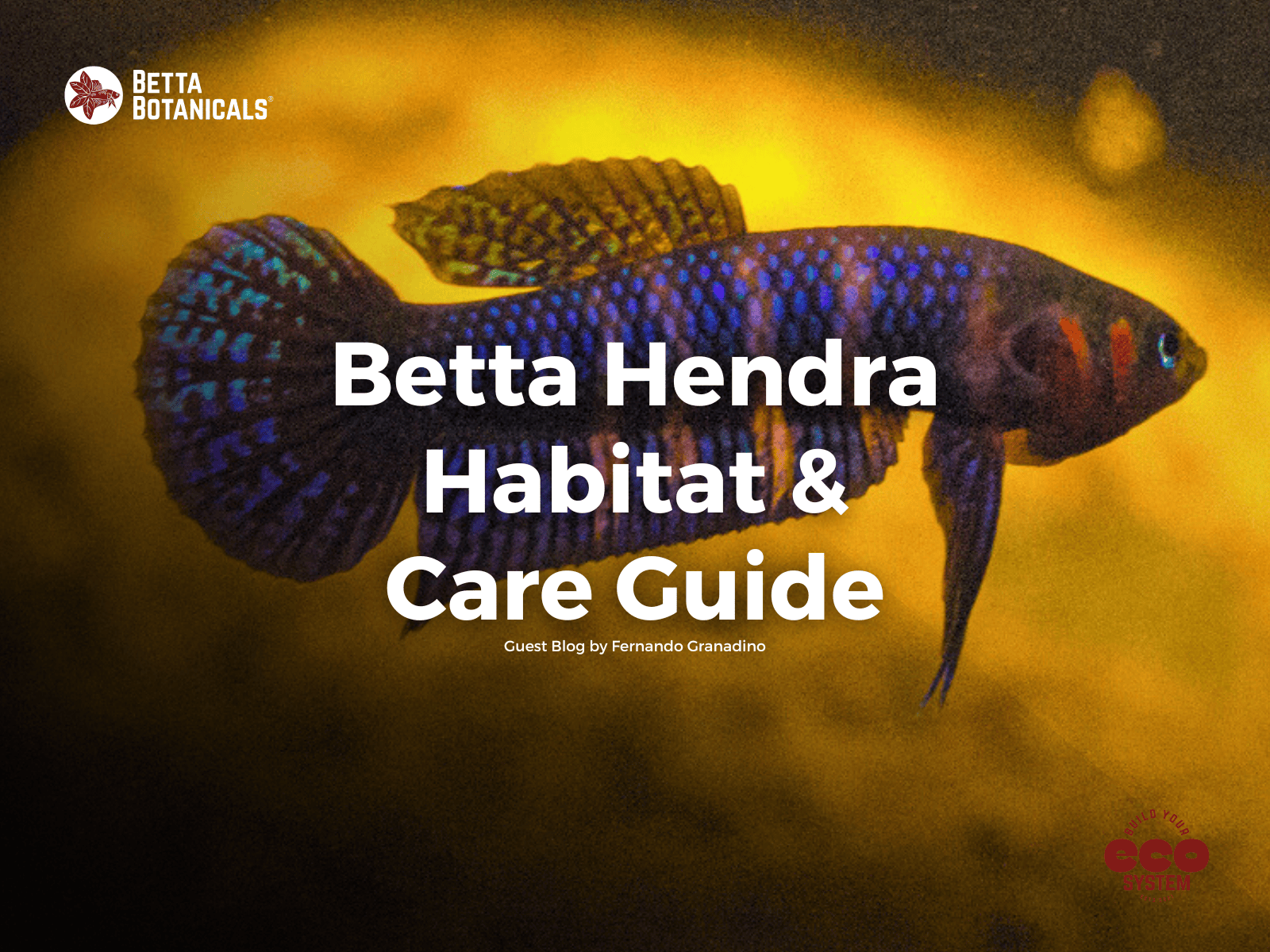
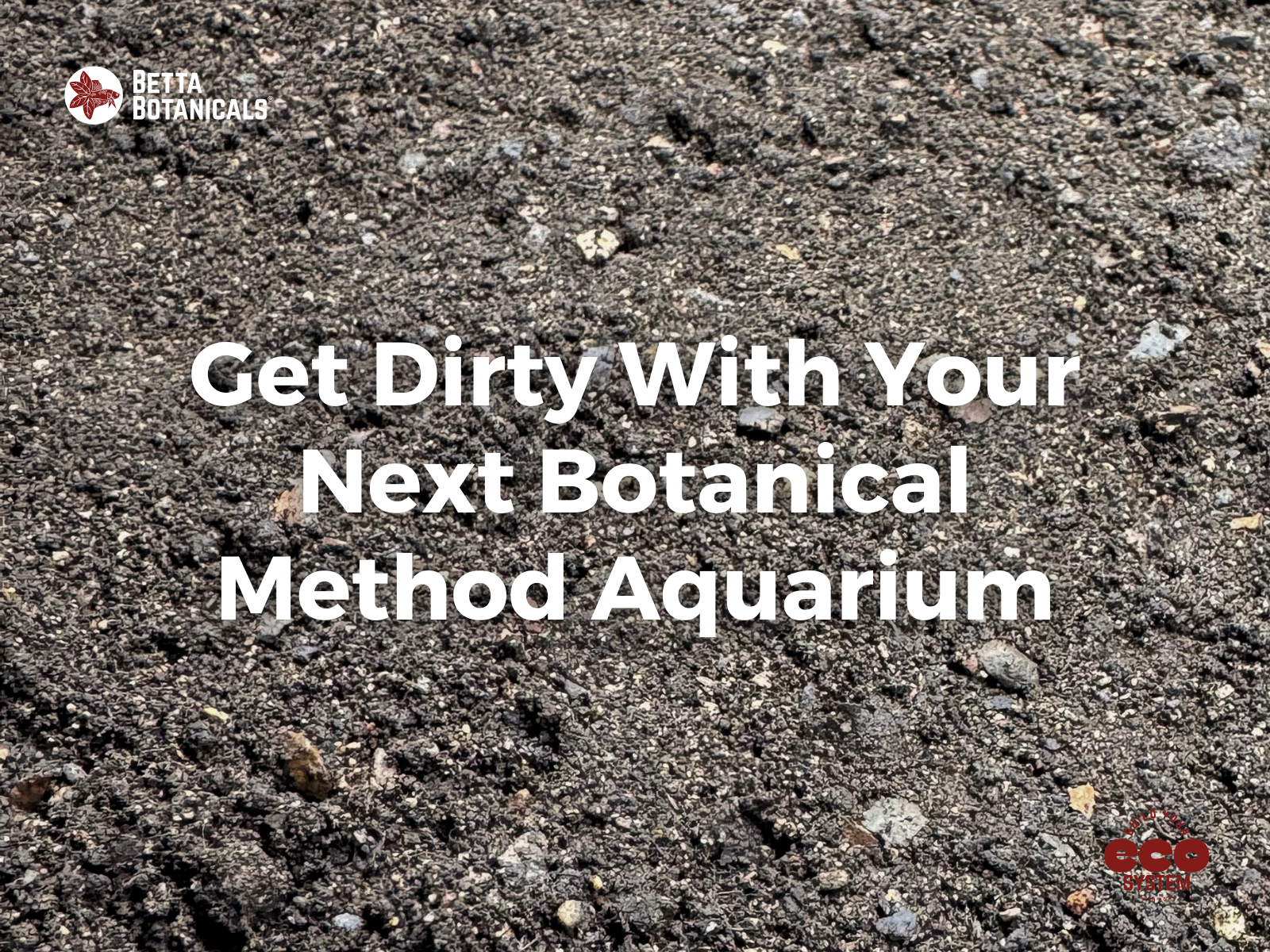
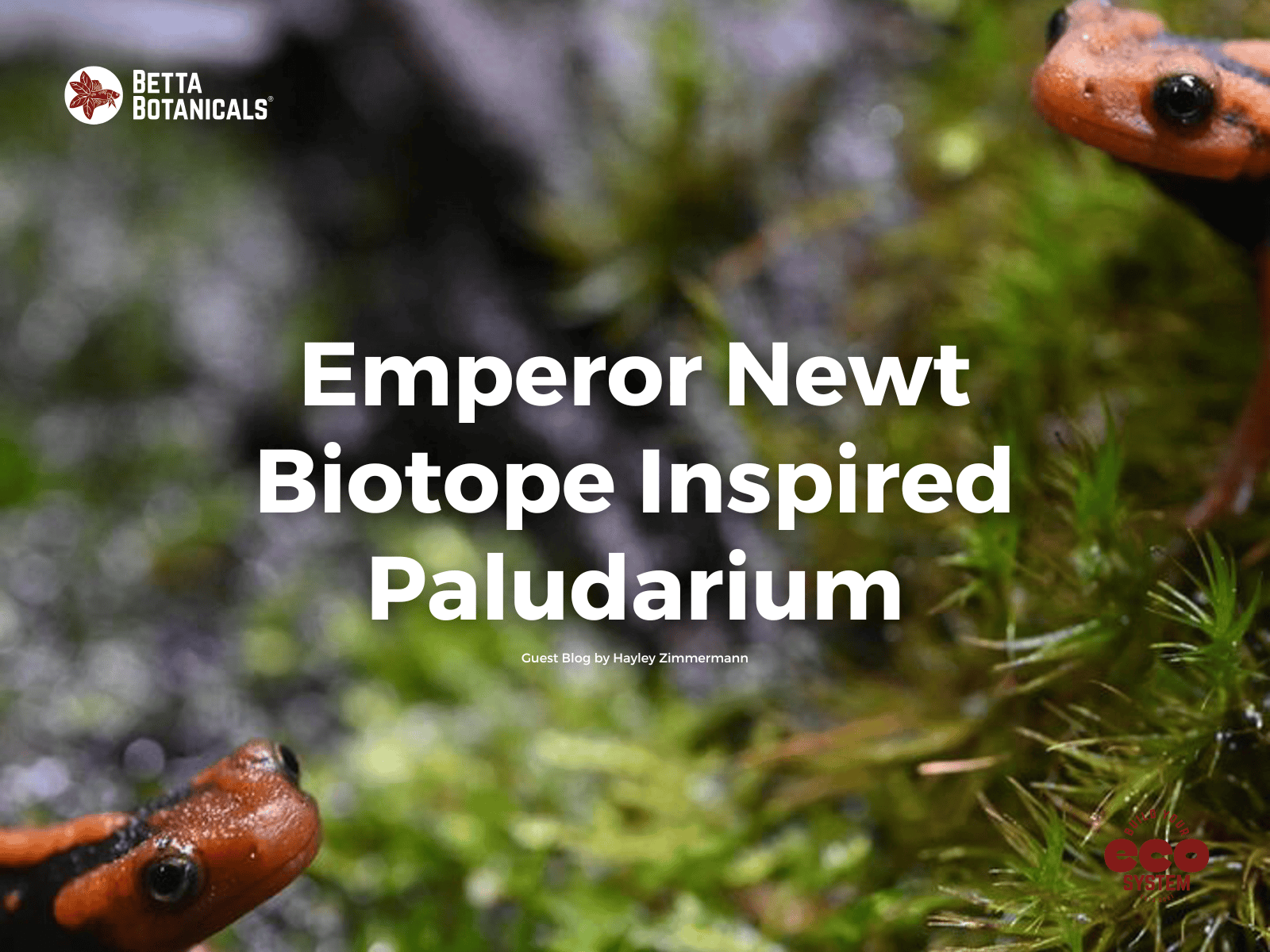
Inspire your friends:
Ecosystem Profile: Borneo Peat Swamp Forests
Key Differences: Biotopes, Blackwater & Botanical Method Aquariums
2 comments
Hey Chetan, I would agree with you. Snails will consume the biofilms growing on the leaf litter and thus continue to breed until the leaf litter is gone. However, I haven’t had an explosion of rams horn snails in my botanical betta tank with Pi yet. I am not a fan of MTS… they are overpopulated and I think take nutrients away from way cooler organisms like copepods, nerite snails, shrimp, etc.
Will leaf litter result in a population explosion of snails? It’s commonly discussed that to keep the snail population in check we need to limit their feeding. Since leaf litter is a constant source of food for snails, will it result in their uncontrolled population explosion? Also, what is your opinion on keeping Malaysian Trumpet Snails? Is their ability to burrow and turn the substrate beneficial/desirable?